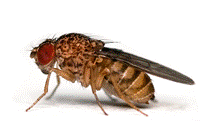Papers in the Biological Sciences

Lawrence G. Harshman Publications
Document Type
Article
Date of this Version
10-2005
Citation
Experimental Gerontology, 2005 October, 40(10): 793–800
Abstract
Age of sexual maturity, daily and lifetime reproductive rates, and life span were recorded in a laboratory cohort of Mexican fruit flies consisting of over 1100 females maintained individually. The results revealed that, relative to the medfly, the Mexfly is slower maturing (14 vs 17 days), more fecund (1400 vs 650–1100 eggs/female), and longer lived (50 vs 35 days). The results reinforced the generality of several earlier findings on the medfly including the deceleration of mortality at older ages and the weakness of the correlation between the rate of egg laying at early ages and both subsequent reproduction and remaining longevity. Discussion includes perspectives on the role of artificial selection in shaping the demographic traits of the mass-reared strain of Mexfly used in this study, as well as the overall significance of large scale biodemographic studies in understanding aging and longevity.
PubMed Central version


Comments
Copyright 2005 Elsevier. Used by permission.